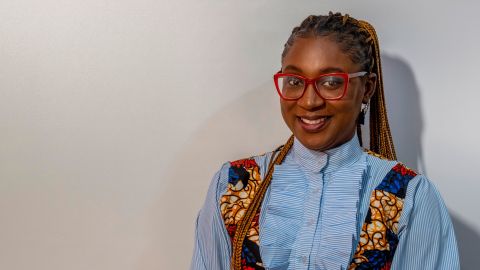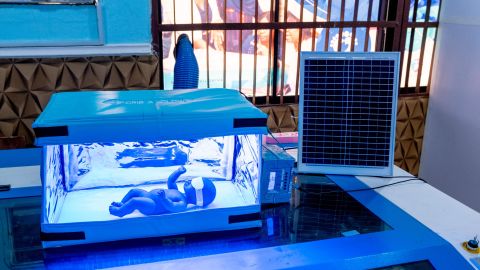This Nigerian tech startup is fighting baby jaundice with solar-powered cribs
This Nigerian tech startup is fighting baby jaundice with solar-powered cribs
#Nigerian #tech #startup #fighting #baby #jaundice #solarpowered #cribs
CNN
—
In 2015, Virtue Oboro experienced every mother’s worst nightmare: at just 48 hours old, her newborn son was rushed into hospital for emergency treatment.
Her son, Tombra, was diagnosed with jaundice, a common condition affecting more than 60% of newborns worldwide. Many cases are mild and resolve on their own, but more serious cases require phototherapy, where babies are placed under blue light.
It’s a simple, effective treatment – but in some places, including Oboro’s home country of Nigeria, access to the necessary equipment isn’t always possible. Not getting treatment can lead to irreversible health problems including hearing loss, vision impairment, brain damage and cerebral palsy. In rare cases, it can lead to death.
Tombra’s case was severe, but there were no phototherapy units available and the family waited four hours while his condition deteriorated.
Eventually, he was given an emergency blood transfusion – a risky surgery that bought valuable time until a phototherapy unit became available. Oboro says she had to buy the bulb herself, and power outages meant the unit was off for several hours during Tombra’s seven-day treatment.

Despite the many obstacles, her son, now six, made a full recovery. But Oboro says the experience was traumatizing – and it inspired her to change careers.
Driven by a new mission to save babies from jaundice, she created the Crib A’Glow: a portable, affordable, solar-powered phototherapy unit, which treats jaundice using blue LED lights.
“I felt like some of the things (I experienced) could have been avoided, or the stress level could be reduced,” she says. “I thought, is there something I could do to make the pain less for the babies and the mothers?”
Jaundice is caused by a build-up in the blood of bilirubin – a yellow compound produced when red blood cells break down. Bilirubin is usually removed by the liver, but newborns’ livers are often not developed enough to do this effectively. The blue light helps to make the bilirubin easier for the liver to break down.
Oboro’s experience with power outages and broken equipment isn’t uncommon in Nigeria, says Hippolite Amadi, a professor of bioengineering at Imperial College, London, who specializes in neonatal medicine and has worked with neonatal centers in Nigeria for over 20 years.
Parents often have to travel long distances to get to a hospital, not all of which have phototherapy units and neonatal specialists, says Amadi. “One can find large numbers of obsolete or dysfunctional systems being applied at some of these centers,” he says, adding that by his estimates, “less than 5% of all Nigerian facilities has sufficient functional phototherapy devices” to serve needy patients.

This increases the likelihood of a negative outcome: it has been reported that in low and middle income countries, infants are 27 times more likely to suffer from brain damage caused by jaundice, and 119 times more likely to die compared to high income nations.
Oboro founded her company Tiny Hearts in 2016, shortly after Tombra’s recovery, and began developing the phototherapy cribs.
As a visual designer, Oboro says she struggled with the medical technicalities. However, her husband had experience working with solar energy and was on hand to help. Oboro also worked with a pediatrician to make sure the device was safe and in line with current phototherapy guidelines.
According to Amadi, one of the most effective phototherapy units currently used in Nigeria costs around $2,000, a steep sum for hospitals on a budget. But Crib A’Glow – produced in Nigeria using local materials – is able to save on added fees like import tax, and retails for $360 per unit. Additionally, because it’s portable and solar powered, the device can be used at home by parents living in remote areas with limited or inconsistent access to electricity.

“Seeing devices coming out that will solve that problem is very exciting,” says Amadi, adding that he would be interested in testing the technology in the practices he oversees. He says innovations like Crib A’Glow could be used in tandem with conventional phototherapy machines, allowing babies to begin jaundice treatment in a hospital and to finish at home.
“Such technology needs to be supported and production scaled up to tackle neonatal conditions in Nigeria,” he adds.
The Crib A’Glow innovation has received award grants including $50,000 from Johnson and Johnson’s Africa Innovation Award. Most recently, the device was selected as a finalist for the Royal Academy of Engineering’s Africa Prize 2022.
Tiny Hearts isn’t the only company trying to improve the treatment of neonatal jaundice. In the US, Little Sparrows Technologies has created the portable “BiliHut” which also uses high-intensity LEDs and allows for at-home treatment, while in India, D-Rev and Phoenix Medical Systems came up with a low-cost phototherapy light stand for emerging markets.
While the Crib A’Glow might seem like an ingenious solution, Oboro says she has faced resistance from hospitals and medical professionals in Nigeria. “It was not an easy thing to get them to test the unit, because the perception was if it was made in Nigeria, it probably would not work well,” she says.
Despite these barriers, the cribs are already being used by more than 500 hospitals across Nigeria and Ghana, treating over 300,000 babies, says Oboro, and the company is hoping to expand into other countries in sub-Saharan Africa.
She says a further 200,000 babies have been helped through their collaborations with rural health workers and education programs, teaching mothers about the symptoms of jaundice – most commonly yellowing of the skin, whites of the eyes and mouth.
Demand for the cribs has soared during the Covid-19 pandemic, says Oboro, as many parents wanted to avoid hospitals and look after their newborns at home. The team is working on protective eye wear, to blindfold babies safely during phototherapy.
Oboro says she feels “lucky and grateful” that Tombra survived – and now it’s her mission to fight neonatal jaundice, and “save a hundred and one more babies.”
#Nigerian #tech #startup #fighting #baby #jaundice #solarpowered #cribs
Source :CNN

